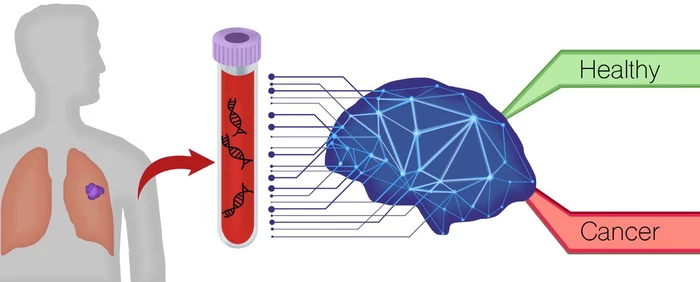A new study led by researchers at Johns Hopkins Kimmel Cancer Center is showing a novel blood test can detect the presence of lung cancer with over 90 percent accuracy. The test uses artificial intelligence to identify abnormal patterns in fragments of cancer DNA circulating in a patient’s bloodstream.
This cancer-detecting blood test focuses on tiny traces of cancer DNA that can be found in a person’s bloodstream. Instead of catching specific fragments of tumor DNA, like some other cancer blood tests currently in development, the new test looks for patterns of DNA fragmentation unique to cancer.
Called DELFI (DNA evaluation of fragments for early interception), the test is based on the knowledge that the nuclei of cancer cells are much more disorganized than healthy cells. Jillian Phallen, a Johns Hopkins researcher working on the test, explained in 2019 that the DELFI test works by looking for certain patterns in circulating DNA fragments.
“For various reasons, a cancer genome is disorganized in the way it’s packaged, which means that when cancer cells die they release their DNA in a chaotic manner into the bloodstream,” said Phallen, upon publishing the project’s proof-of-concept report in 2019. “By examining this cell-free DNA (cfDNA), DELFI helps identify the presence of cancer by detecting abnormalities in the size and amount of DNA in different regions of the genome based on how it is packaged.”
Using machine-learning the researchers studied millions of cfDNA fragments to determine abnormal patterns associated with the presence of lung cancer. This new study, published in the journal Nature Communications, offers a thorough validation of the DELFI approach in two different cohorts of lung cancer patients.

The study showed the DELFI approach effectively detected 94 percent of lung cancer patients. Later-stage lung cancer patients were more accurately detected, with 96 percent of stage 3/4 lung cancers picked up by the method.
“DNA fragmentation patterns provide a remarkable fingerprint for early detection of cancer that we believe could be the basis of a widely available liquid biopsy test for patients with lung cancer,” explains Rob Scharpf, a co-author on the new study.
A larger clinical trial is now underway to test the DELFI approach. That ongoing trial will look to refine the test’s sensitivity and specificity detecting lung cancer, while also working to differentiate lung cancer cfDNA patterns from other kinds of cancers, such as bladder, kidney and colorectal.
The new study was published in the journal Nature Communications.
Source: John Hopkins Medicine




